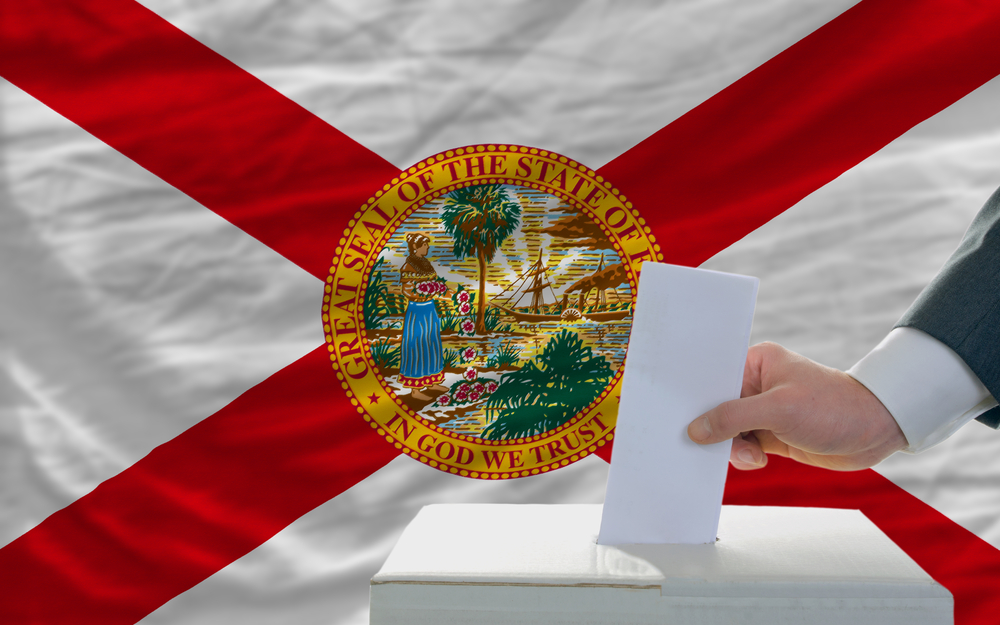A new wind blew over Florida on Nov. 6, 2018, bringing with it a renewed air of bipartisan support for criminal justice reform. The overwhelming voter approval of constitutional amendments 4 and 11 uplifted the spirits of criminal justice reform advocates across the state and beyond; it offered great hope to directly impacted communities and sent a strong signal to lawmakers that Floridians wanted to see substantive and smart justice reform. Finally, it seemed as though Florida was catching up with other states that had enacted criminal justice reforms.

Tachana J. Marc
Then the legislative session got underway.
Amendment 4 allowed the automatic restoration of voting rights for people with felony convictions — except those with a murder or felony sex offense conviction — who had completed their sentences. It is estimated that more than one million formerly incarcerated individuals will benefit from the change.
The impact was immediate. In the two days after Jan. 8, 2019, which was the effective date of Amendment 4, voter registration had nearly doubled the daily average since the 2018 midterm election day. A total of 8,179 new voters registered.
Amendment 11 repealed the savings clause, which had banned any changes to a criminal statute from being applied retroactively. The savings clause was highly uncommon, as most states with such a provision have it as a state statute, not embedded in their constitutions. In fact, only Oklahoma and New Mexico have a savings clause in their constitutions.
The savings clause required that prior prosecution and sentence of any crime under a specific criminal statute be grandfathered in if changes are made to that statute. The adverse implication of the savings clause was widely seen when the legislature amended drug sentencing laws in 2014. Two people who committed the same offense just one day apart, June 30 and July 1, 2014, received significantly different sentences, with the former carrying a sentence five times longer than the latter.
Implementing bills affect African Americans most
Despite the unambiguous language of Amendment 4 and its unequivocal call for an automatic restoration of voting rights, the legislature has deemed it necessary to propose implementing bills. Both chambers prescribe a uniform standard for implementation statewide. However, the bills differ on how they define the completion of all terms of sentence. The House bill, HB 7089, seeks to have all court fines and fees that are terms of sentence must be paid in full in order to register to vote, while the Senate bill, SB 7086, aims to broaden the list of exempted offenses and require that only restitution fees are considered as terms of sentence. Amendments are expected for both bills, and they will likely go to the floor for a full vote.
The implementing bill for Amendment 11 proposes that all changes made to a criminal statute are to be applied prospectively unless otherwise stated in the amending bill. Its language also provides relief for current inmates whose sentences were locked in, despite changes in the law, while still awaiting trial.
The provisions set forth by the implementing bill for Amendment 4 have massive racial and economic implications. If enacted, African Americans would be disproportionately impacted. Florida’s courts rely so heavily on fines and fees as their primary source of revenue that the system has been dubbed “cash register justice.” Such fines and fees made up 96% of their total revenue in 2016.
Almost everyone who goes through the system ends up with some sort of legal financial obligation. Florida’s court fines and fees are inherently regressive, as they do not take into account an individual’s income. Whether you have the means to pay or not, it’s still obligatory; in 2003, the state took away the court’s ability to waive certain fees for indigent defendants. Failure to pay may result in arrest and/or driver’s license suspension.
For more information on Racial-Ethnic Fairness, go to JJIE Resource Hub | Racial-Ethnic Fairness
African Americans are disproportionately incarcerated in Florida, constituting 47% of the state’s prison population while making up only 17% of the state population. Further, they make up more of Florida’s lowest income group. In 2015, 27% of African Americans in Florida earned less than $18,700, compared to 21% of Latinos and roughly 18% of whites.
While it can be argued that formerly incarcerated people should pay for the associated costs of their prosecution, it is imperative to understand the reentry landscape in Florida, and how it is nearly impossible for inmates to successfully reintegrate into society. Those who are released from prison face insurmountable challenges when seeking meaningful work opportunities, affordable housing and community support programs.
There is an array of institutionalized barriers, such as broad occupational licensing, “check the box” policies and the Florida Legislature’s decades of anemic investment into critical rehabilitation programs. For example, this fiscal year, the Department of Corrections was forced to cut $29.5 million from key rehabilitative services and community corrections and supervision programs due to the agency’s financial woes, which have been ignored by lawmakers over the years. Yet, the proposed budgets for the next fiscal year fail to allocate adequate funding to make up for the current loss.
As a result of the ubiquity of court fines and fees, along with the over-representation of African Americans in Florida’s prisons and their limited ability to expeditiously pay their court fines and fees, this bill presents the perfect formula to prevent or delay black people with felony convictions from participating in the electoral process.
Burden would be on sponsor
The implementing bill for Amendment 11 contradicts the fundamental tenet of what Floridians voted for. By requiring criminal retroactivity to hinge on the legislature’s approval, the bill is mostly perpetuating the status quo that has greatly contributed to the state’s ballooning inmate population. Furthermore, if enacted, the bill would place the burden on a bill’s sponsor to make a compelling case for why retroactivity is appropriate. Because a bill with a retroactivity clause departs from the status quo, it would likely be more challenging to gain full approval from both chambers. Consequently, this would potentially dissuade legislators from pursuing and enacting groundbreaking reform policies that could rectify some of the harms fueled by Florida’s decades of ineffective and “tough on crime” policies.
A prime illustration of this is Florida’s $300 felony theft threshold, which has not been revised since 1986. When adjusted for inflation, the threshold would be $693 in 2019 dollars. Felony grand theft of $300 to $5,000 is punishable by up to five years in prison and a $5,000 fine. Florida has the second lowest felony threshold in the country; it falls way below the national median of $1,000. Nearby states like Texas and Georgia have changed their laws in recent years, setting their thresholds at $2,500 and $1,500, respectively. For the past few years, any bill that has tried to increase the state’s felony threshold died without a full vote in either chamber.
This session, SB 7072 and HB 589 would increase the limit to $750 and $1,000, respectively. These bills are gaining more traction than in prior years and are likely to receive a full vote. However, the impact would only be seen prospectively. The increased threshold would do nothing to correct the state’s past mistakes and it would offer no relief to those who were sent to jail under the $300 threshold.
People currently serving a disproportionate sentence would have to continue enduring the marginalization attached to being labeled a felon under Florida’s arbitrarily low felony theft threshold, and those on probation would continue to be saddled with thousands of dollars in fines. These bills, if enacted, would not alleviate the plight of directly impacted communities because state legislators are consciously thwarting the retroactive power of Amendment 11.
This is not the first time the Florida Legislature has chosen to stubbornly ignore the wishes of voters when it comes to creating implementing policies for a constitutional amendment. For example, in 2016, Floridians approved medical marijuana, but a law was passed right after banning all forms of marijuana smoking. With these two amendments, it is clear that defying the wishes of votes has become routine. It is also equally clear that as much as lawmakers tout criminal justice reform, they are still not ready to truly embrace the different dimensions of smart justice.
Tachana J. Marc is a policy analyst focused on criminal justice issues at the nonpartisan Florida Policy Institute.

Pingback: How Florida Legislature Is Circumventing Voters' Will for Criminal Justice Reform - Juvenile Justice Information Exchange - C4 FL
The better statistic is that black men make up 8.4% of Florida’s population but 46% of its prisoners. This shows the racial injustice much better